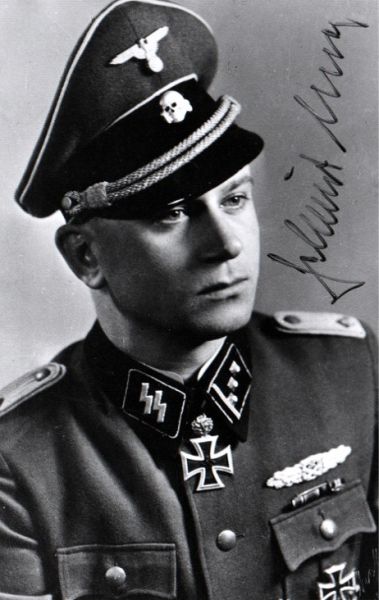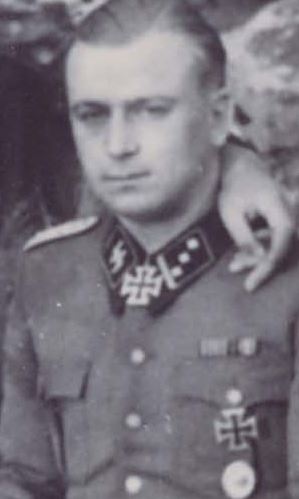Scholz, Helmut (Waffen SS)
- Date of birth:
- July 1st, 1920 (Grottkau/Upper Silesia, Germany)
- Date of death:
- November 12th, 1997 (Wanne-Eickel, Germany)
- Service number:
- SS-Nr.: 423.819 (V) // NSDAP-Nr.:
- Nationality:
- German
Biography
00.00.1934-00.00.1937: NAPOLA Wahlstatt
00.07.1937-00.11.1937: Reichs-Arbeits-Dienst
01.12.1937: Freiwilliger, 3. Sturm, SS-Standarte "Germania"
00.00.1938: SS-Standarte "Der Führer"
00.00.1939: SS-Junkerschule Braunschweig
01.09.1939: promoted to SS-Unterscharführer
00.05.1940: campaign in France
00.11.1940: SS-Uscha, 1. Kompanie, SS-Regiment "Wiking"
00.06.1941: campaign in Russia
01.11.1941: sent again to the SS-Junkerschule Braunschweig
20.04.1942: promoted to SS-Oberjunker
21.06.1942: promoted to SS-Untersturmführer
00.06.1942: SS-Ustuf, OO, III. Bataillon, SS-Infanterie-Regiment "Nordland"
00.06.1943: SS-Ustuf, Zugführer, SS-Panzergrenadier-Regiment 49 "De Ruyter"
00.03.1944: distinguished himself at the Narva bridgehead
20.04.1944: promoted to SS-Obersturmführer
04.06.1944: awarded the RK as SS-Ustuf, Führer, 7. Kompanie, SS-Panzergrenadier-Regiment 49
15.08.1944: distinguished himself as SS-Ostuf, Führer, II. Bataillon, SS-Panzergrenadier-Regiment 49 in the North West of the Peipus Lake
21.09.1944: axarded the Eichenlaub
00.10.1944: Adjutant, SS-Freiwilligen-Panzergrenadier-Regiment 48
30.01.1945: promoted to SS-Hauptsturmführer
Do you have more information about this person? Inform us!
- Period:
- Second World War (1939-1945)
- Period:
- Second World War (1939-1945)
- Period:
- Second World War (1939-1945)
- Awarded on:
- 1942
- Period:
- Second World War (1939-1945)
- Awarded on:
- October 14th, 1942
- Period:
- Second World War (1939-1945)
- Awarded on:
- February 17th, 1943
- Period:
- Second World War (1939-1945)
- Period:
- Second World War (1939-1945)
- Awarded on:
- 1943
- Period:
- Second World War (1939-1945)
- Rank:
- SS-Untersturmführer (2nd Lieutenant)
- Unit:
- Chef, 7. Kompanie, SS-Freiwilligen-Panzergrenadier-Regiment 49 “de Ruyter”, 23. SS-Freiwilligen-Panzergrenadier-Division “Nederland”
- Awarded on:
- June 4th, 1944
“On the 13.03.1944, at 00:00, the Russians launched an attack against the positions of the II./SS-Freiw.Pz.Gren.Rgt. 49 ‘De Ruyter’, which lay to the south of Lilienbach. The 6. Kompanie of the Bataillon had been fighting in uninterrupted combat since the 08.03.1944, and had already taken substantial losses. As such the Russians succeeded in penetrating the line there. The enemy immediately turned towards the south and began to roll up the position of the Bataillon. The commander of the 6. Kompanie was wounded, and the Bataillon commander fell during an attempt to launch a counterattack with a few men.
SS-Untersturmführer Scholz, commander of 7. Kompanie (located south of 6. Kompanie), noticed the battle noises and determined that the Russians must have penetrated there. In order to ascertain the situation, he went to the left wing of his Kompanie with some men. While advancing through the woods he already encountered the enemy.
Hereupon SS-Untersturmführer Scholz made the decision to take the handful of troops available to him and launch a counterattack of his own. At the head of his small unit, he smashed through the much numerically superior enemy and pushed them back through the woods in hard close combat. Through his outstanding personal bravery he inspired his men to continue forwards. In this way he succeeded in throwing the superior enemy forces from the position. After the enemy had been ejected, SS-Untersturmführer Scholz demonstrated his prudence by taking over the leadership of 6. Kompanie in addition to his own Kompanie (which had previously fended off the Russian attack against its sector of the front).
Through his personal initiative, which came in tandem with an exemplary devotion to duty, SS-Untersturmführer Scholz did not only overcome a dangerous crisis caused by the death of the Bataillon commander and the penetration of strong enemy elements. By his swift response he also saw to it that the divisional reserve (which arrived in the sector of the II. Bataillon after the penetration had been eliminated) did not have to be committed. By his actions he thereby significantly contributed to the successful holding of the Regiment’s sector while also helping to avert the disintegration of the Narwa bridgehead.”
- Period:
- Second World War (1939-1945)
- Rank:
- SS-Obersturmführer (Lieutenant)
- Unit:
- Kommandeur, II. Bataillon, SS-Freiwilligen-Panzergrenadier-Regiment 49 “de Ruyter”, 23. SS-Freiwilligen-Panzergrenadier-Division “Nederland"
- Awarded on:
- September 21st, 1944
“1.) On the 29.07.1944, following a 2 hour drumfire, the enemy attacked the sector of the II./SS-Freiw.Pz.Gren.Rgt. 49 with the support of about 50 tanks. SS-Obersturmführer Scholz had taken over control of the Bataillon after its previous commander was wounded. Although a deep enemy penetration had taken place in the sector of the right neighbour, and the situation on the right flank of the Bataillon was largely unclear, Obersturmführer Scholz made the ruthless decision to hold his line along its full extent without regard for his flank. He was the soul of the resistance for his Bataillon, and he inspired his men to fight harder with his own personal bravery. When 9 enemy tanks (some heavy) overran his frontline, he personally entered into close combat against them along with his staff. In the ensuing combat 3 enemy tanks were destroyed with close combat weapons.
His decisiveness and personal bravery ensured that the frontline of his group was held along its full extent, and that the possibility existed for the right flank of the group to be shielded against the enemy penetration area.
It is to his personal credit that the enemy attempt to break through to the road was smashed with high losses of men and materiel.
2.) On the 02.08.1944 the Russians commenced an attack from Orphanage Hill towards the north, rolling up the trench line south of the road that had been held during the defense on the 29.07.1944. One of the group’s counterthrusts became pinned down by heavy fire on the road. Obersturmführer Scholz personally went to the break-in area and took over leadership of the counterthrust. Showing great personal bravery, he went forth with the reserves and threw the enemy out of the German position following close combat.
Through his decisiveness and bravery, the trench line and strongpoint south of the road was retaken. This strongpoint was of great importance for the group’s sector, as it provided a good position for flanking fire for the south and eastern front of the group as well as a place from which to observe the enemy forces on the eastern slope of Orphanage Hill.”
591st Award
- Period:
- Second World War (1939-1945)
- Awarded on:
- 1944
Sources
- Photo 1: Willi Schumacher Collection
- Photo 2:
- - Schneider J.W., Their Honor was Loyalty!, R. James Bender Publishing, 1977
- Microfilm Publication A3343. US National Archives. - Lexikon der Wehrmacht















